Riverside County advocates want COVID-19 testing for homeless on the streets
This story was produced as part of a larger project led by Nicole Hayden, a participant in the USC Center for Health Journalism's 2020 California Fellowship, covering homelessness in the Coachella Valley.
Her other stories include:
Palm Springs shelter avoided COVID-19. Homeless say they need more than protection from virus
Project Roomkey funding ends soon. Over 11,000 Californians could become homeless, again
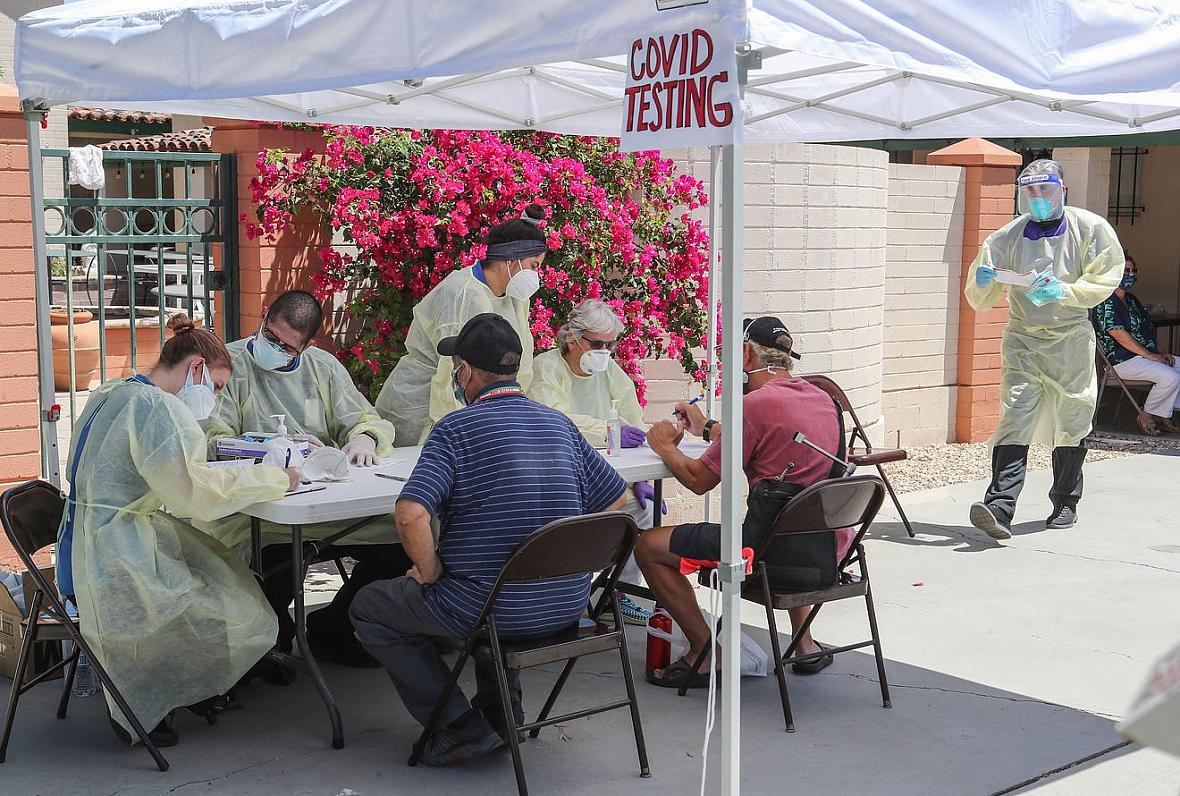
Jay Calderon/ The Desert Sun
Robert Villa sleeps nestled against brush tucked along a busy road, hidden from view. His home is the open desert, a white tarp and three suitcases piled haphazardly nearby. Even in this hidden niche, the 33-year-old isn’t immune to the impacts of the coronavirus
He lost his job as a server at a local restaurant after it closed due to the pandemic and he no longer knows what resources are available to him during this time.
“It’s hard with businesses closed right now,” he said. “I can’t work, and I can’t approach people to ask for food because I feel like they are more scared of me now, like, I feel like people think I look unwashed and will have (coronavirus).”
As sand swirled around the eastern Coachella Valley and the sun bore down on Monday evening, Villa initially declined a COVID-19 test offered by workers from nonprofit Coachella Valley Volunteers in Medicine, the only free medical clinic in the region.
"I didn't want to get tested because if they see just me getting tested then I would have that stigma that I must have it," he said.
The Coachella Valley Volunteers in Medicine screen and test homeless individuals for coronavirus at Our Lady of Guadalupe Church in Palm Springs, May 15 , 2020.Jay Calderon/ The Desert Sun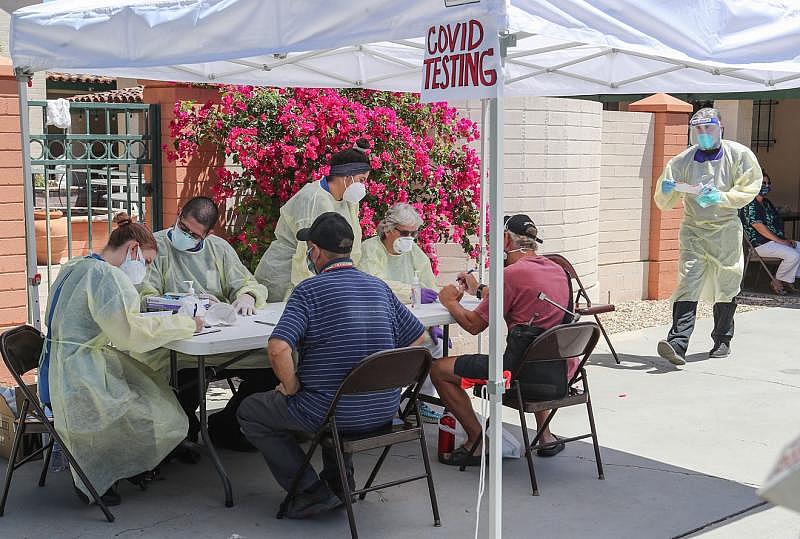
In Riverside County, fewer than 15 homeless individuals in shelters have tested positive for coronavirus, said Jose Arballo, Riverside County Public Health spokesman. That's less than 1% of the county's total homeless population.
However, the number of homeless individuals who have been tested is unknown. The county hasn’t conducted targeted testing in that community, said Greg Rodriguez, homeless liaison and policy advisor to Riverside County Supervisor V. Manuel Perez. The county has not conducted mass testing at any shelter or encampment, Arballo said.
Ten residents between the Coachella Valley's two permanent overnight shelters, the Coachella Valley Rescue Mission and Martha’s Village and Kitchen in Indio, have been tested to date — all were negative, Rodriguez said.
“If someone seems symptomatic, we make sure they get tested,” Rodriguez said. “So far, we haven’t heard of any homeless individuals contracting COVID-19 in the Coachella Valley.”
Coachella Valley Volunteers in Medicine has tested about 50 unsheltered homeless individuals across the valley. That's about 8% of the valley's total homeless population, according to the 2019 point-in-time count.
Homeless outreach workers say targeted COVID-19 testing needs to be prioritized for this under-served community because many have underlying health conditions that make them likely to have severe complications due to the virus. testing of this specific population, they say, could help stop an outbreak before it happens.
“We asked the county for testing for the unsheltered homeless and have gotten no response for the last eight weeks, so we got private donors to help us,” said Rosa Lucas, homeless outreach coordinator for Coachella Valley Volunteers in Medicine. “How do we know what resources to provide if we don’t know who is positive?”
Dr. Richard Loftus administers a coronavirus test to Ronald Rogers at Our Lady of Guadalupe Church in Palm Springs, May 15, 2020. Rogers was one of several homeless people being tested for coronavirus. The Coachella Valley Volunteers in Medicine tested homeless individuals. Jay Calderon/ The Desert Sun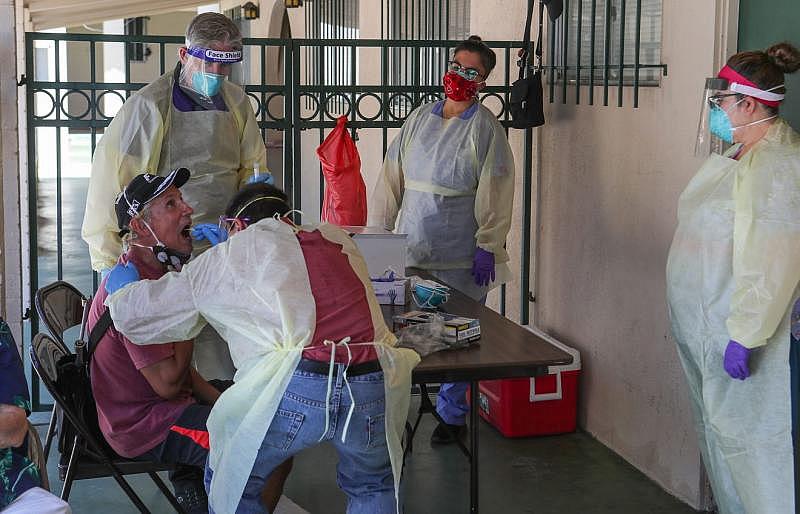
What is unique about the homeless population is the threat of rapid spread, especially among asymptomatic carriers. In Washington, three affiliated homeless shelters saw outbreaks in April. As the shelters continued to test additional people, more positive cases were revealed, according to a report from the U.S. Centers for Disease Control and Prevention. Many were asymptomatic.
Similarly, additional testing conducted after an outbreak at a Boston shelter found that 146 of the 400 residents were positive. All 146 were asymptomatic, meaning those individuals could have easily passed the virus to others at the shelter or encampments during travel between destinations. Without testing, spread of the virus likely would have continued among Boston's homeless population.
While Riverside County has not provided targeted homelessness COVID-19 testing, Rodriguez said it has ensured shelters implemented best practices with necessary resources such as hand sanitizer, face masks and thermometers to monitor staff and residents for fever.
Nonprofit brings COVID-19 testing 'to the people'
About 10 volunteer health care workers — including physicians, nurse practitioners, medical students and nursing students — fanned out across the eastern Coachella Valley on Monday evening. Each wore a yellow disposable gown, gloves and masks. Those performing throat swabs also wore plastic face guards. The personal protective gear was donated by Rancho Mirage hospital Eisenhower Health.
Among them was Rep. Raul Ruiz, D-Palm Desert, who helped secure the testing donations and performed some of the swabs himself.
“This community is already high-risk,” Ruiz said. “They already suffer from poor nutrition, dehydration — they are impacted by the heat. Many have diabetes and other underlying diseases. On top of that, the simple ways that we stay safe, such as washing our hands, is not easily accessible to (homeless individuals) who don’t have running water or soap.”
Congressman Paul Ruiz talks with an individual experiencing homelessness in the eastern Coachella Valley before testing him for COVID-19. Ruiz worked with the Coachella Valley Volunteers in Medicine to bring testing to the streets. Hernan Quintas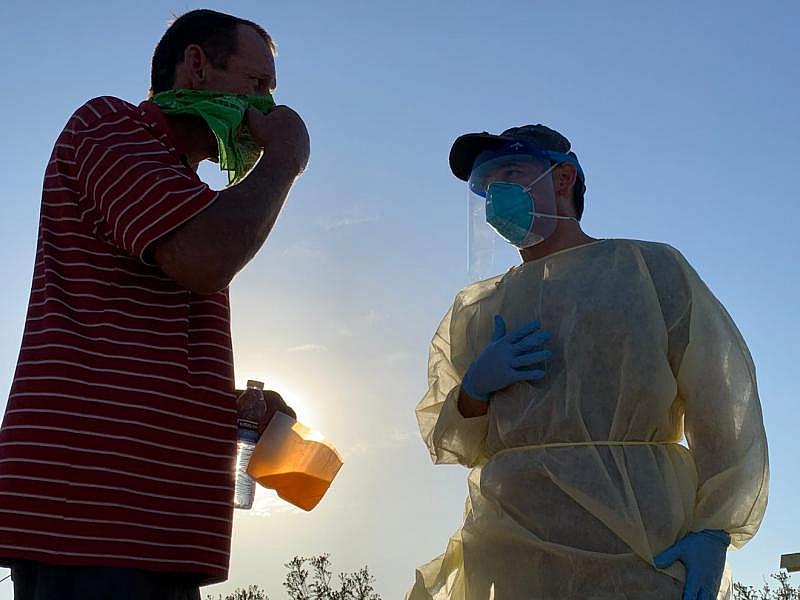
After Villa, who sleeps along a busy road in the eastern Coachella Valley, initially declined a swab, Ruiz told him the virus can be passed on by people who don't have symptoms. He informed Villa that the test only takes a minute, and convinced him to participate.
Each test costs about $52, which Lucas’ team does not ask patients to pay. In total, Coachella Valley Volunteers in Medicine spent about $13,000 for the 250 tests. When her son asked her what she wanted for Mother's Day this year, Lucas told him she wanted two more COVID-19 tests — so he donated $104 to CVVIM.
This wasn’t the organization's first time “going to the people” to provide care, Lucas said — they provide street medicine to homeless individuals every Tuesday. But it was the first time a street medicine team provided COVID-19 testing to individuals experiencing homelessness in the valley.
The Coachella Valley Volunteer in Medicine is working to bring COVID-19 testing to the streets of the valley.Hernan Quintas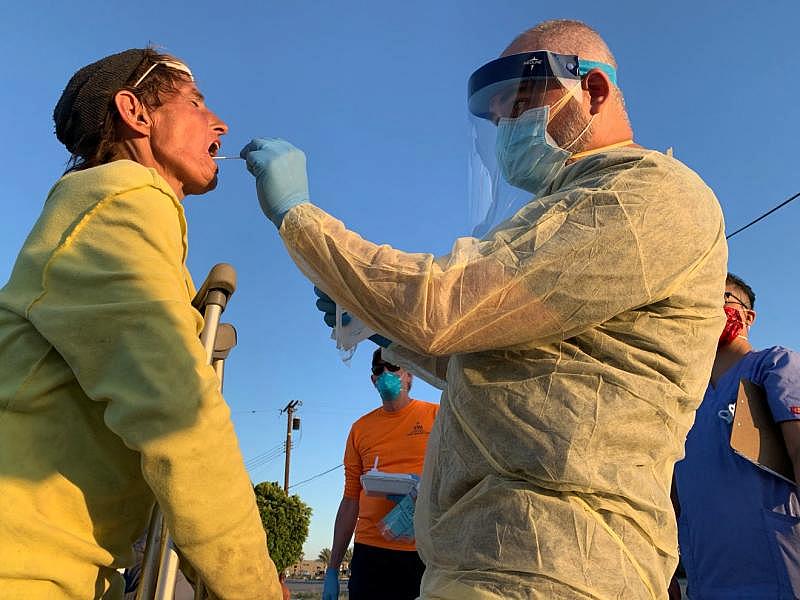
The nonprofit's already-established history with patients helped expedite proactive coronavirus care. The workers already knew who might be more high-risk for developing severe symptoms, such as a young man in Coachella who consistently has had high blood sugar each week, which he said is due to his poor diet of eating inexpensive or donated food
Coachella Valley Volunteers in Medicine on Friday brought testing for homeless individuals in Palm Springs, partnering with the local daytime shelter, Well in the Desert. Director Arlene Rosenthal, however, said she doesn't believe her clients have a high risk of being exposed to the virus.
"Our people are not in huge crowds together," she said. "Their camps are smaller. And I don't think they are at the same risk of contracting the virus (as) old folks in those homes where the air is stale."
Dr. Richard Loftus, bottom, administers a coronavirus test to an individual Our Lady of Guadalupe Church in Palm Springs, May 15, 2020. The Coachella Valley Volunteers in Medicine tested homeless individuals. Jay Calderon/ The Desert Sun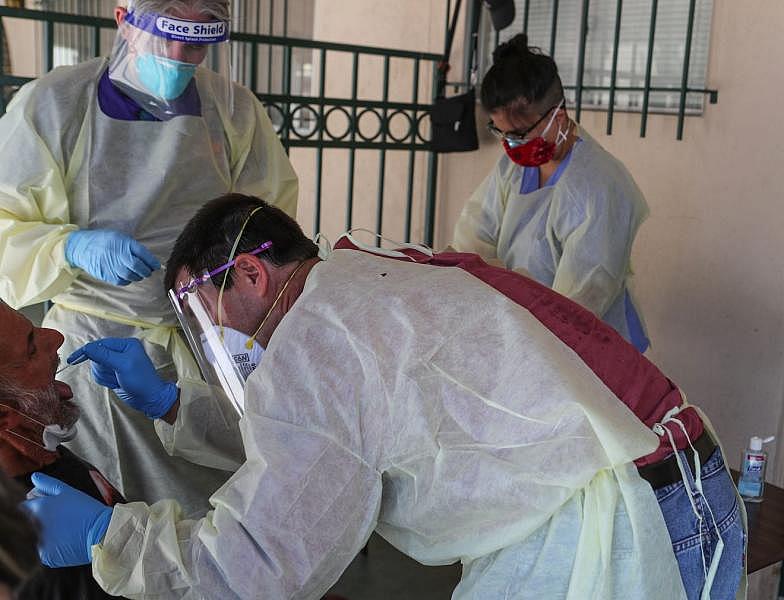
Combatting COVID-19 requires education
A key component of the outreach is education. The street medicine team on Monday evening encountered many unsheltered individuals who weren’t aware of what COVID-19 symptoms look like — or that someone can be a carrier and not have symptoms.
David Brennan, who walked around Coachella with a green bandana around his face, said he did so mostly because he saw other people doing it. Brennan said he had heard of the virus but didn’t know much about it.
“You can have it and not know it and pass it to others,” Ruiz said, after asking Brennan if he wanted to be tested. “Since no one has been tested out here, you wouldn’t know if you have it or not.”
“Oh, so people can be carriers?” Brennan asked. “OK, let’s do it then. Fair enough. I’d rather know. And I already know I am high-risk.”
After the swab was done, Brennan said he thought it was a good idea that everyone gets tested. “It could really wipe out a lot of people,” he said.
Before Ruiz walked away, Brennan modeled how he is able to wash his hands: He collects water from a leaking water tank nearby, filling a bucket to use as his "sink," and has stocked up on hand soap.
Another man, living just a short walk away from Brennan, also consented to a coronavirus test. He stays with his mom sometimes, he said, and is worried about exposing her if he’s a carrier.
He said he likely wouldn’t have gotten tested if the street medicine team didn’t come — he doesn’t have a car to drive to any of the local testing sites. The nearest is at the Indio Fairgrounds, 5 miles away.
Testing and isolation might have narrowly averted an outbreak in an Oakland encampment at the end of April. After a patient experiencing homelessness was treated at a local hospital, health officials used contact tracing measures to determine who else that individual came in contact with. Those people, also homeless, were placed in hotel units to isolate away from other encampment residents, according to The Mercury News.
Those proactive steps set this response apart from a similar outbreak reported in San Francisco in mid-April. About 60% of the 150 people staying overnight at the Multi-Service Center South shelter in San Francisco tested positive.
Ruiz urges collaboration from the county
Coachella Valley Volunteers in Medicine provided 200 tests in Mecca, targeting the high-risk populations of essential farmworkers and packaging plant workers, before saving the remaining 50 for unsheltered homeless individuals.
Ruiz said that while he believes the philanthropic community in the valley will lead to continued unsheltered COVID-19 testing, the responsibility of securing and allocating the necessary resources should fall to Riverside County.
“It would be great if the county partnered with this effort to make it part of their coordinated outreach plans,” Ruiz said. “It’s important to have a methodology for doing targeted testing, and a plan of what happens when someone tests positive.”
Rep. Raul Ruiz, D-Palm Desert, performs a COVID-19 test on an individual experiencing homelessness in the eastern Coachella Valley. Ruiz, a physician, worked with the Coachella Valley Volunteers in Medicine to bring testing to the streets. Hernan Quintas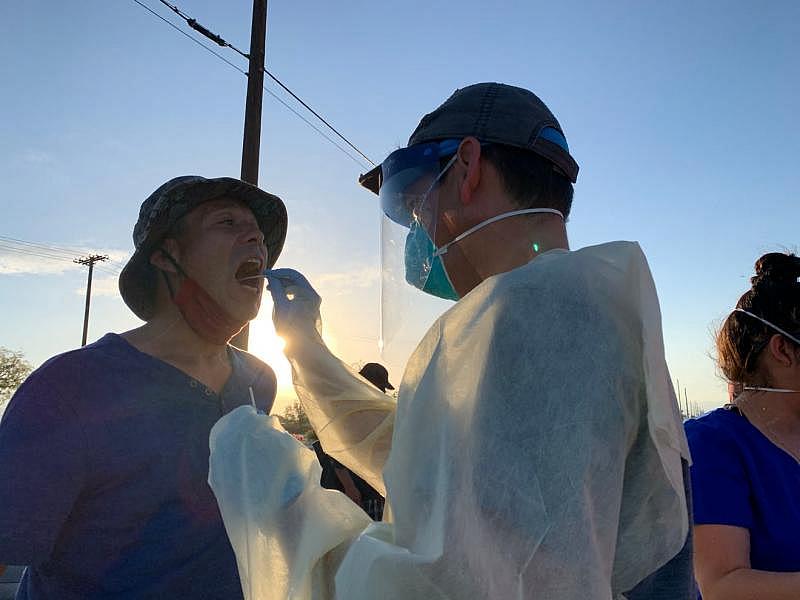
Since the street medicine team isn't a housing organization, they do not have resources to provide that next step if someone tests positive. However, Riverside County has established hotel space for that very scenario, where homeless individuals can stay while they recover. None have been needed yet.
“Ideally, we would keep them housed in those placements unless they choose to leave after their quarantine period is over,” Rodriguez said. “Countywide, we had one rumor of someone testing positive in a shelter, but that was false. We haven’t seen anyone test positive unsheltered or sheltered.”
Rodriguez said the county doesn't have a specific number of those units blocked off for just that purpose, but if this situation arose, they would "have ample rooms to address."
In addition to testing and care, Ruiz said the county should function as the main hub for coordinating other outreach efforts among local organizations to provide masks, water and soap to unsheltered homeless individuals.
Testing resources were limited at the start of the pandemic, said Rodriguez, the county's homeless liaison. However, if a nonprofit wanted to coordinate a homeless COVID-19 outreach team with Riverside County, that could be arranged now, he added.
Coachella Valley Volunteers in Medicine currently has 10 to 15 tests left. The nonprofit plans to raise additional money to purchase more.
Shelter director: Precautions have mitigated need for mass testing
For those experiencing homelessness who aren’t living on the streets, Coachella Valley shelters have offered some protection from COVID-19 exposure.
The Coachella Valley Rescue Mission in Indio has banned any non-essential visitors and changed how it provides meals to the community. That means group meetings have been canceled, and free meals are offered as carry-outs for those who aren’t currently residing at the mission, said Coachella Valley Rescue Mission Program Manager Scott Wolf.
However, not everyone is aware of the changes. Villa said he hasn't had access to food in the past few weeks because he thought the mission's "no visitor" rule meant it also stopped its community dinners.
John Webster, who has lived at the rescue mission for about seven months, said he feels safer at the Indio facility than outside of it.
John Webster wears a facemask while living and working at the Coachella Valley Rescue Mission in Indio, April 16, 2020.Jay Calderon/ The Desert Sun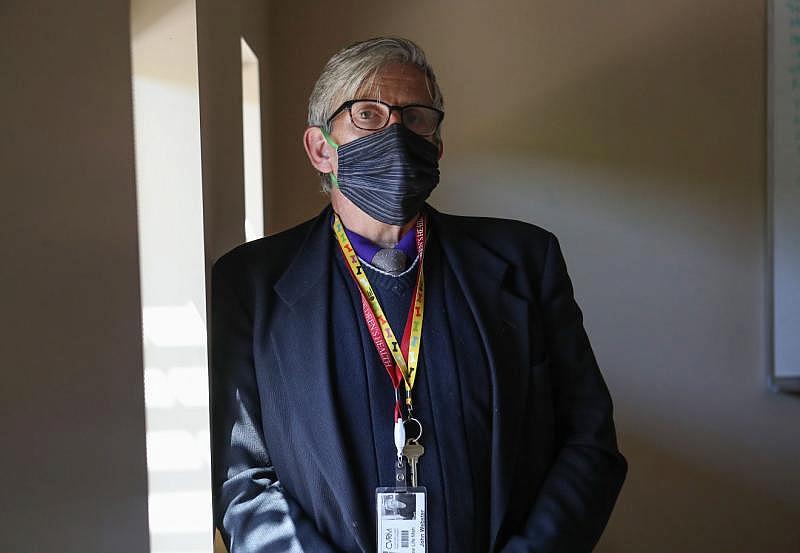
“I went out to the store to run an errand for Easter because I needed grape juice and crackers, so we could do communion here,” the 60-year-old said. “So, I went to the supermarket and it was crazy to see how the shelves were bare and how empty places were, it felt like an apocalypse. Staying here, I feel like we are protected from being exposed to (the coronavirus).”
Sanitation protocols have been increased, fabric masks or surgical masks have been given to all residents, and fever checks are done routinely.
Webster lives in one of the men’s dorms at the mission, with about 20 bunk beds. While the beds are eight to 10 feet apart from each other, he is still very close to his bunk mate.
“All of us here are only really exposed to each other though,” he said. “So, it still feels protected and we sanitize all the surfaces in the dorms multiple times a day, wear masks and try to keep our distance from each other.”
Cindy Fadness, 35, is staying in a single room at the mission with her two kids. She still socializing with the other mothers, and the kids still play in the courtyard.
Zechariah Delavern, 5, stares into the camera as his mother Cindy Fadness has her hands full with her one-year-old son Jeremiah Delavern as they live in quarantine at the Coachella Valley Rescue Mission in Indio, April 16, 2020. Jay Calderon/ The Desert Sun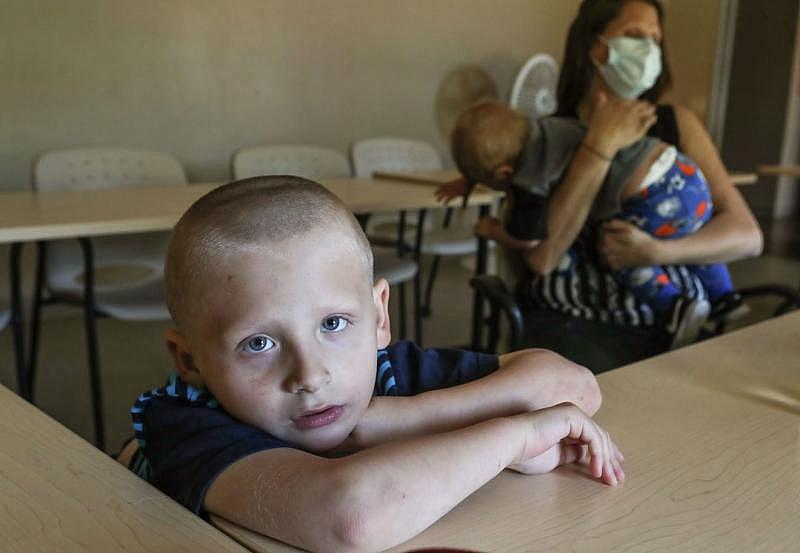
“It’s frustrating that we can’t leave because the kids are really getting antsy, but the corner store takes orders and will drop things off for us,” Fadness said. “They love Cheetos and chocolate milk.”
While the shelter hasn't requested resources for mass testing at the congregate facility, Wolf said he believes the other precautions the shelter has taken — such as fever screening and increased cleaning protocols — has led to no one testing positive, yet.
300+ high-risk homeless individuals temporarily housed in county hotels
Across Riverside County, 370 homeless individuals have been placed in additional hotel/motel units, secured with emergency funding from the state, to temporarily house those at high-risk for severe complications from the virus. About 100 are in the Coachella Valley.
Congressman Raul Ruiz talks with an individual experiencing homelessness in the eastern Coachella Valley before testing him for COVID-19. Ruiz worked with the Coachella Valley Volunteers in Medicine to bring testing to the streets. Hernan Quintas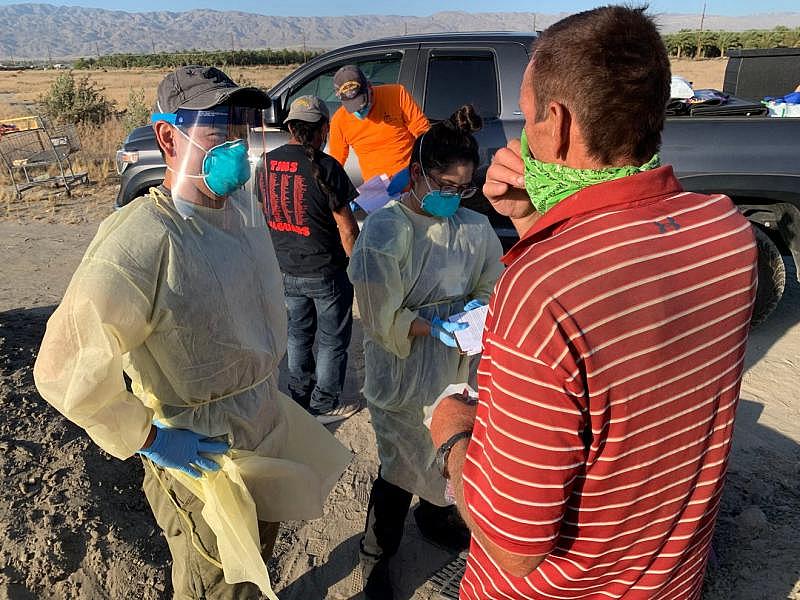
Rosenthal said about 30 of her clients at the Well in the Desert have been placed in one of the non-coronavirus units.
Those placements will remain until Gov. Gavin Newsom lifts the stay-at-home order. It costs just under $72 per person per day to house and feed the temporary hotel/motel residents.
Rodriguez said county staff began working with those individuals just last week to help them possibly transition into long-term housing once the temporary placement ends.
“We definitely don’t want to send everyone back out on the street,” he said.
Meanwhile, the Coachella Valley Volunteers in Medicine on Thursday received test results from outreach earlier in the week.
None of the nearly 50 unsheltered homeless individuals tested positive.
Desert Sun reporter Nicole Hayden covers health in the Coachella Valley. She can be reached at Nicole.Hayden@desertsun.com or (760) 778-4623. Follow her on Twitter @Nicole_A_Hayden.
This article was produced as a project for the USC Annenberg Center for Health Journalism’s 2020 California Fellowship.
[This story was originally published by Desert Sun.]

